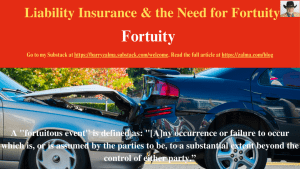Liability Insurance & the Need for Fortuity

Post 4724
See the full video at https://rumble.com/v4a2ie8-liability-insurance-and-the-need-for-fortuity.html and at https://youtu.be/7P2LjIWo5F8
Liability insurance requires that the loss or damage that needs defense or indemnity from an insurer, must be contingent or unknown at the time the policy was acquired. For insurance to apply, on a third party policy, the risk of loss insured against must be fortuitous. Simply stated fortuitous means the loss happened by chance. The doctrine of fortuity (accidental or unintended acts causing injury) requires it be established that the event was a chance event beyond the control of the insured. [Martin/Elias Props., 544 S.W.3d at 643 & Blakeley v. Consol. Ins. Co. (Ky. Ct. App. 2021)]
A “fortuitous event” is defined as: “[A]ny occurrence or failure to occur which is, or is assumed by the parties to be, to a substantial extent beyond the control of either party.”
Thus, the requirement of a fortuitous loss is a necessary element of insurance policies based on either an “accident” or “occurrence.” The insured has the initial burden of proving that the damage was the result of an “accident” or “occurrence” to establish coverage where it would not otherwise exist [Northville Indus., 89 N.Y.2d at 634).] Once coverage is established, the insurer bears the burden of proving that an exclusion applies. [Consolidated Edison Co. v. Allstate Ins., 774 N.E.2d 687, 746 N.Y.S.2d 623, 98 N.Y.2d 208 (N.Y. 2002)]
Insurance is designed to protect against unknown, fortuitous risks, and fortuity is a requirement of all policies of insurance. [Burlington Ins. Co. v. Tex. Krishnas, Inc., 143 S.W.3d 226, 230 (Tex. App.-Eastland 2004, no pet.); Scottsdale Ins. Co. v. Travis, 68 S.W.3d 72, 75 (Tex. App.-Dallas 2001, pet. denied); Two Pesos, Inc. v. Gulf Ins. Co., 901 S.W.2d 495, 502 (Tex.App.-Houston [14th Dist.] 1995, no writ) (op. on reh’g).]
An insured cannot insure against something that has already begun and which is known to have begun. [Summers v. Harris, 573 F.2d 869, 872 (5th Cir.1978).]
The fortuity doctrine precludes coverage for two categories of losses: known losses and losses in progress. A “known loss” is one that the insured knew had occurred before the insured entered into the contract for insurance. [Burch v. Commonwealth County Mut. Ins. Co., 450 S.W.2d 838, 840-41 (Tex.1970)] A “loss in progress” involves those situations in which the insured knows, or should know, of a loss that is ongoing at the time the policy is issued. [Warrantech Corp. v. Steadfast Ins. Co., 210 S.W.3d 760 (Tex. App. 2006)]
When a trial court determined that the plaintiffs’ complaint did not allege any bodily injury or property damage caused by an “occurrence.” In reaching this conclusion, it relied on Cincinnati Insurance Company v. Motorists Mutual Insurance Company, 306 S.W.3d 69, 73-74 (Ky. 2010), as corrected July 19, 2011. In Cincinnati Insurance Company, the Kentucky Supreme Court held that “accident” and “occurrence” are unambiguous, and that they embody the principle of “fortuity” inherent in all liability insurance policies.
In determining whether an event constitutes an accident courts must analyze this issue according to the doctrine of fortuity:
whether the insured intended the event to occur; and
whether the event was a chance event beyond the control of the insured.
Policy language insuring against accidents applies only if the insured did not intend the event or result to occur. [Blakeley v. Consol. Ins. Co. (Ky. Ct. App. 2021)]
Wisconsin caselaw provides several alternative definitions, all of which attempt to capture the fortuity principle central to liability insurance. [Lucterhand v. Granite Microsystems, Inc., 564 F.3d 809, 812-13 (7th Cir.2009).] An “accident” for purposes of liability insurance coverage is “[a]n unexpected, undesirable event or an unforeseen incident which is characterized by a lack of intention.” [Everson v. Lorenz, 2005 WI 51, ¶ 15, 280 Wis.2d 1, 15, 695 N.W.2d 298, 15 (2005) (internal quotation marks omitted).] The word “accident,” in accident policies, means an event which takes place without one’s foresight or expectation. A result, though unexpected, is not an accident; the means or cause must be accidental. [Am. Family Mut. Ins. Co. v. Am. Girl, Inc., 2004 WI 2, ¶ 37, 268 Wis.2d 16, ¶ 37, 673 N.W.2d 65, ¶ 37 (2004) (quoting BLACK’S LAW DICTIONARY 15 (7th ed.1999); and Eberts v. Goderstad, 569 F.3d 757 (7th Cir. 2009)]
Faulty workmanship is not included in the standard definition of “property damage” because “a failure of workmanship does not involve the fortuity required to constitute an accident.” [9A Couch on Insurance 3d § 129:4.] Liability insurance is not intended to act as a performance bond. [W. World Ins. Co. v. Carrington, 90 N.C.App. 520, 523, 369 S.E.2d 128, 130 (1988)] Since the quality of the insured’s work is a “business risk” which is solely within his own control, liability insurance generally does not provide coverage for claims arising out of the failure of the insured’s product or work to meet the quality or specifications for which the insured may be liable as a matter of contract. [Builders Mut. Ins. Co. v. Mitchell, 709 S.E.2d 528 (N.C. App. 2011)]
Insurance policies generally require “fortuity” and thus implicitly exclude coverage for intended or expected harms. New York Insurance Law § 1101(a)(1) itself defines “insurance contract” as: “any agreement * * * whereby one party, the `insurer’, is obligated to confer benefit of pecuniary value upon another party, the Insured’, * * * dependent upon the happening of a fortuitous event * * *.”
A “fortuitous event” is defined as: “[A]ny occurrence or failure to occur which is, or is assumed by the parties to be, to a substantial extent beyond the control of either party.” (§ 1101[a][2].) Thus, the requirement of a fortuitous loss is a necessary element of insurance policies based on either an “accident” or “occurrence.” [Consolidated Edison Co. of Ny v. Allstate, 774 N.E.2d 687, 98 N.Y.2d 208, 746 N.Y.S.2d 622 (N.Y. 2002)]
Fortuity must be judged using a subjective standard, because requiring this knowledge element best serves the overall principle of insurance law. [Aetna Cas. & Sur. Co. v. Dow Chemical Co., 10 F.Supp.2d 771, 789 (E.D.Mich.1998)] The crucial issue is whether the insured was aware of an immediate threat of the injury for which it was ultimately held responsible and for which it now seeks coverage, not the insured’s awareness of its legal liability for that injury. [Aetna Cas. & Sur. Co. v. Com., 179 S.W.3d 830 (Ky. 2005)]
The term “probability” indicates the presence of contingency and fortuity, the lack of which is the very essence of the known loss doctrine. Even if there is a probability of loss, there is some insurable risk, and the known loss doctrine should not apply. [Sentinel Ins. Co., Ltd. v. First Ins. Co. of Hawai’i, Ltd. (1994), 76 Hawai’i 277, 875 P.2d 894, 920.]
“Certainty,” on the other hand, refers not to the likelihood of an occurrence, but rather to the inevitability of an occurrence. Therefore, a “substantially certain” loss is one that is not only likely to occur, but is virtually inevitable. [General Housewares Corp. v. National Surety Corp., 741 N.E.2d 408 (Ind. App. 2000)]
The “fortuity” and “accident” concepts require that first party insurance does not protect against losses which are certain to occur and third party liability insurance does not protect against nonaccidental harm inflicted by the insured. [Commercial Union Ins. Co. v. Superior Court (1987) 196 Cal.App.3d 1205, 1207-1209, 242 Cal.Rptr. 454.); Chu v. Canadian Indemnity Co., 274 Cal.Rptr. 20, 224 Cal.App.3d 86 (Cal. App. 1990)]
Faulty workmanship is not included in the standard definition of ‘property damage’ because ‘a failure of workmanship does not involve the fortuity required to constitute an accident. [Builders Mut. Ins. Co. v. Mitchell (N.C. App. 2011)]
The principle of fortuity is central to the notion of what constitutes insurance. [Cincinnati Ins. Co. v. Motorists Mut. Ins. Co., 306 S.W.3d 69, 74 (Ky.2010), quoting 46 Corpus Juris Secundum, Insurance, Section 1235 (2009).] The parties to an insurance agreement in effect, wager against the occurrence or non-occurrence of a specified event; the carrier insures against a risk, not a certainty. [Bartholomew v. Appalachian Ins. Co., 655 F.2d 27, 29 (1st Cir.1981).] Given this, courts have recognized that the principle of fortuity can be both an inherent requirement of every insurance contract and a specified requirement reflected in particular terms agreed to by the parties. [ 3 Peritz, Law and Practice of Insurance Coverage Litigation, Section 35:3 (July 2021), quoting Robert Keeton, Insurance Law, Section 5.4(a), at 288 (1971)] A requirement that loss be accidental in some sense in order to qualify as the occasion for liability of an insurer is implicit, when not express, because of the very nature of insurance. [Motorists Mut. Ins. Co. v. Ironics, Inc., 2022 Ohio 841 (Ohio 2022)]
Adapted from my book Insurance Fraudsters Deserve No Quarter Available as a paperback here. Available as a hardcover here. Available as a Kindle Book here.
 (c) 2024 Barry Zalma & ClaimSchool, Inc.
(c) 2024 Barry Zalma & ClaimSchool, Inc.
Please tell your friends and colleagues about this blog and the videos and let them subscribe to the blog and the videos.
Subscribe to my substack at https://barryzalma.substack.com/publish/post/107007808
Go to Newsbreak.com https://www.newsbreak.com/@c/1653419?s=01
Go to X @bzalma; Go to the podcast Zalma On Insurance at https://podcasters.spotify.com/pod/show/barry-zalma/support; Go to Barry Zalma videos at Rumble.com at https://rumble.com/c/c-262921; Go to Barry Zalma on YouTube- https://www.youtube.com/channel/UCysiZklEtxZsSF9DfC0Expg; Go to the Insurance Claims Library – http://zalma.com/blog/insurance-claims-library.
Like this:
Loading…



